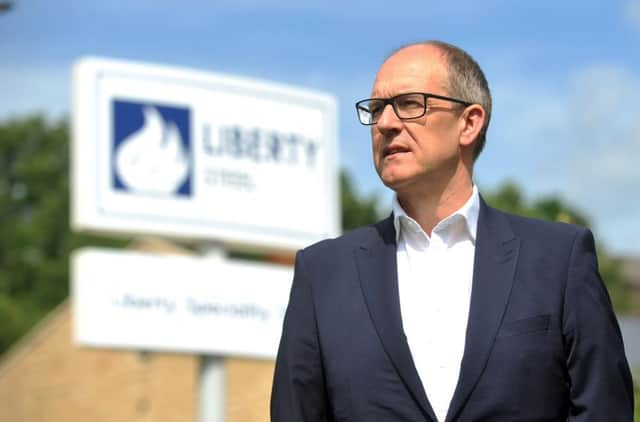Steel giant's investment could help to support 1,800 jobs


Jon Bolton, chief executive of Liberty Speciality Steels, said the business could start to work with more local suppliers who want to support the steel industry.
Last month, Liberty formally completed a £100m deal to acquire the Speciality Steels division of Tata Steel UK. The agreement protected the jobs of 1,700 existing staff at three major sites at Rotherham, Stocksbridge and Brinsworth in South Yorkshire, smaller sites in Bolton, Lancashire, and Wednesbury in the West Midlands, and two distribution centres in China. The company announced expansion plans which are expected to generate an extra 300 production jobs in the business.
Advertisement
Hide AdAdvertisement
Hide AdMr Bolton told The Yorkshire Post: “You’ve got new people coming in with a different vision for the business who are prepared to make changes to the way the business is organised. I do see it as an opportunity. For steel generally, we are at quite a turning point.”
He added: “You’ve got to put money into the business. So we’re re-starting plants that were mothballed. You’ve got to make sure they are able to operate effectively. But, of-course, the biggest impact economically, is the number of jobs we will create.”
Mr Bolton said that, when a steel firm creates 300 jobs, it would normally stimulate the creation of six times that number in the supply chain and wider regional economy.
Mr Bolton said he wanted to see more young people choosing to take up careers in the steel industry.
Advertisement
Hide AdAdvertisement
Hide AdHe added: “You’ve got to demonstrate you have a clear vision, and unfortunately despite the best efforts of the industry, the vision has been established by headlines of restructuring, job losses, plant closures and the troubles the business has been through.
“But what we’re trying to do in Liberty, and what we’re trying to do as a steel sector, is present a very positive image of the future.
“If you’re employing more people, you can train more people, you can go into schools and sell the business in a positive light.
“Immediately, you start to energise the local environment. You can see that people see a future for themselves by staying in the region and having a future within industry.”
Advertisement
Hide AdAdvertisement
Hide AdLiberty has said it plans to focus on re-commissioning the small bloom caster at Aldwarke Cast Products, and re-commissioning the coil line at Thrybergh.
It also aims to re-establish a product testing and release facility within the business.
Mr Bolton, who was born in Scarborough has worked in the steel industry for 37 years, said he wanted to see a supportive industrial strategy where the full value of the steel industry could be seen in the wider economic context.
He believes that lessons can be learned from Germany’s approach to devising an industrial strategy.
Advertisement
Hide AdAdvertisement
Hide AdHe added: “Everybody turns to Germany to look at parallels and how that works; it is an industrial strategy and an industrial supply chain.”
BREXIT provides an opportunity for industry to think about what can be produced within the UK, according to Mr Bolton.
Mr Bolton said: “One of the reasons the steel industry hasn’t been able to grow and support some of the various industrial sectors is because those customers aren’t actually here.
“The automotive sector, for example, has gone through a huge on-shoring programme which is bringing supplies back into the UK.
Advertisement
Hide AdAdvertisement
Hide Ad“When that happens, which maybe more likely to happen in a Brexit scenario, then you are starting to fill back in that supply chain and..provide yourself with more opportunities to supply into that supply chain.”